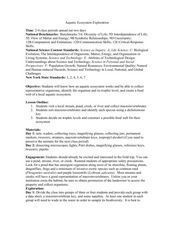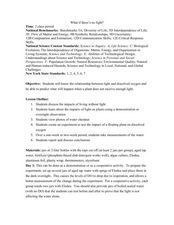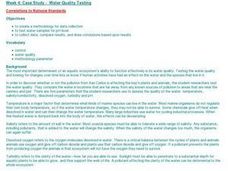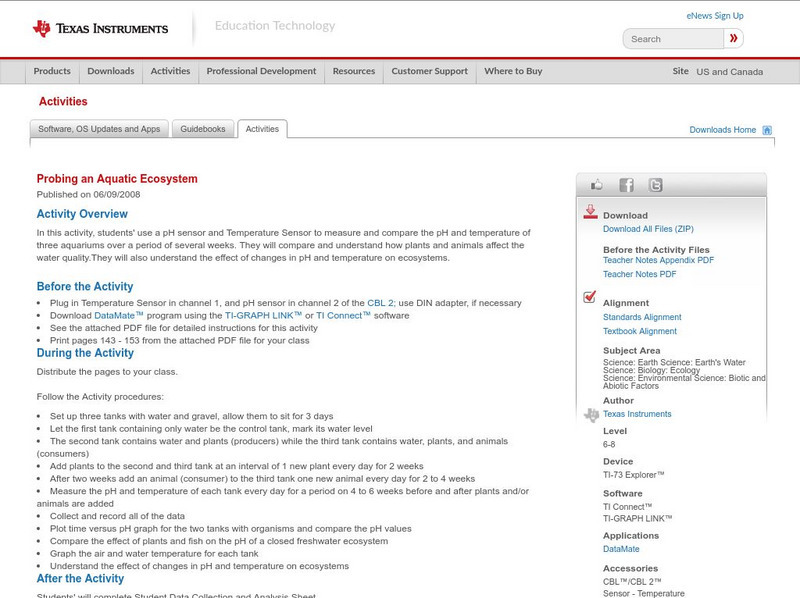Curated OER
Using Environmental Models to Determine the Effect of Acid Rain on an Ecosystem
Demonstrate to your middle school science learners how chalk breaks down in a weak acid. Discuss what affects acidic rain might have on ecosystems. Lab groups then choose one of two questions: "How does acid precipitation affect an...
Curated OER
Does a change in pH affect the growth and survival rate of aquatic plants?
Pupils determine if changes in pH affect the growth and survival rates of aquatic plants. They evaluate the optimal pH levels for the growth of aquatic plants.
Curated OER
Biocomplexity Lab Activity: Measuring Water pH
Students test unknown solutions for pH levels to determine which organism can live in each environment. They name three substances that they think are acids. Students determine a solution is an acid or base. They define the term pH.
Curated OER
Water Quality And pH
Students determine the pH level of water and its effect on aquatic plants and brine shrimp eggs. This is a three part lesson that leads the student through the development of an understanding of water pH. They form a hypothesis and are...
Curated OER
Aquatic Science and IPC
Students explain the importance of water in our daily lives. For this aquatic science lesson, students identify different ways to purify water and make it potable. They design and construct a water filter based on researched information.
Curated OER
Aquatic Ecosystem Exploration
Students visit a local stream, pond, creek, or river and collect macroinvertebrates. They sort macroinvertebrates and identify each species using a dichotomous key. Students decide on trophic levels and construct a possible food web for...
Curated OER
Measuring Aquatic pH
Students apply the scientific method and safety rules to aquatic pH. They test unknown solutions for pH levels.
Curated OER
Water Quality Monitoring
Students comprehend the four parameters of water quality. They perform tests for salinity, dissolved oxygen, pH and clarity or turbidity. Students comprehend why scientists and environmental managers monitor water uality and aquatic...
Curated OER
Ecosystem Damage from Household Cleaners
Third graders assess the damage done to various ecosystems by cleaning products and discover how scientists test water quality. Using stream water and common household cleaning agents, they work in groups to test for pH levels. Once...
Curated OER
Raindrops Keep Burning On My head
Students investigate the effects and causes of acid rain. They test pH of household items to familiarize themselves with pH scale and compare that information with acid rain solutions. They investigate impact of acid rain via internet...
Curated OER
What If There's No Light?
students discuss the importance of light and the consequences of living without it. Using a plant as a demonstration, students predict and observe what happens to a plant when it does not receive enough light. In groups, they experiment...
Curated OER
Salinity Of Soil
Fourth graders investigate the contents of various types of soil to determine the differences in salinity levels. They conduct an experiment of observing the plants in the different soils. Students then determine survival rates by...
Curated OER
Acid Rain
Students understand the dynamics of acid rain and its impact on the living and non-living environment. They hypothesize how acid rain affects water pH levels in two lake systems with differing watershed features.
Curated OER
How about a Little Give and Take?
Students design a closed system to test the relationships between plants and animals. They monitor abiotic fluctuations within this living system by using a chemical test kit. They observe how living organisms respond to fluctuations in...
Curated OER
Water Quality Testing
Student explore factors affecting ecosystems. They test local water samples for pH level. After creating a methodology for data collection, they collect data, compare results, and draw conclusions based upon results.
Curated OER
Marine & Aquatic Habitats -- Journey of a Drop of Water Through a Watershed
Students discuss pollution and the steps in the hydrologic cycle. They follow a drop of water through a watershed simulation. They discover the components of a water cleaning system as well.
Curated OER
Acid Rain: Where Have All the Rainbows Gone?
Students study the pH scale and sources of acid precipitation. In this acid rain lesson students complete a lab on acid rain then complete a handout.
Curated OER
Pollution Solutions
Young scholars visit a local park to test the quality of the aquatic environments. They search for sources of pollution and examples of pollution control. Based on their obeservations and experiments, they rate their local environment.
Curated OER
Is Our Water Healthy?
High schoolers test water for a least one chemical characteristic. They hypothesize how a storm event might change the chemical characteristics of a stream. Students collect water samples and use the chemical test to test the water.
Curated OER
How Much Water is in That River?
Students practice measurement using the Hudson River. They calculate the discharge measurement at a location on the Hudson River using ingenuity and a topographic map.
Curated OER
There Are Algae in Your House!
Young scholars demonstrate that, although we sometimes can neither smell nor taste them, many ingredients in our foods and household products come from the sea. They also investigate food eat to determine algae derivatives they contain.
Curated OER
How Our Water Becomes Polluted
Learners list causes of water pollution, discuss how people contribute to water pollution, and explain concept of watershed.
Texas Instruments
Texas Instruments: Probing an Aquatic Ecosystem
In this activity, students' use a pH sensor and Temperature Sensor to measure and compare the pH and temperature of three aquariums over a period of several weeks. They will compare and understand how plants and animals affect the water...
PBS
Pbs Learning Media: Acid Lake
Students will add acidity to a healthy lake to see what happens to plants and animals in this interactive activity adapted from EcoKids.

























